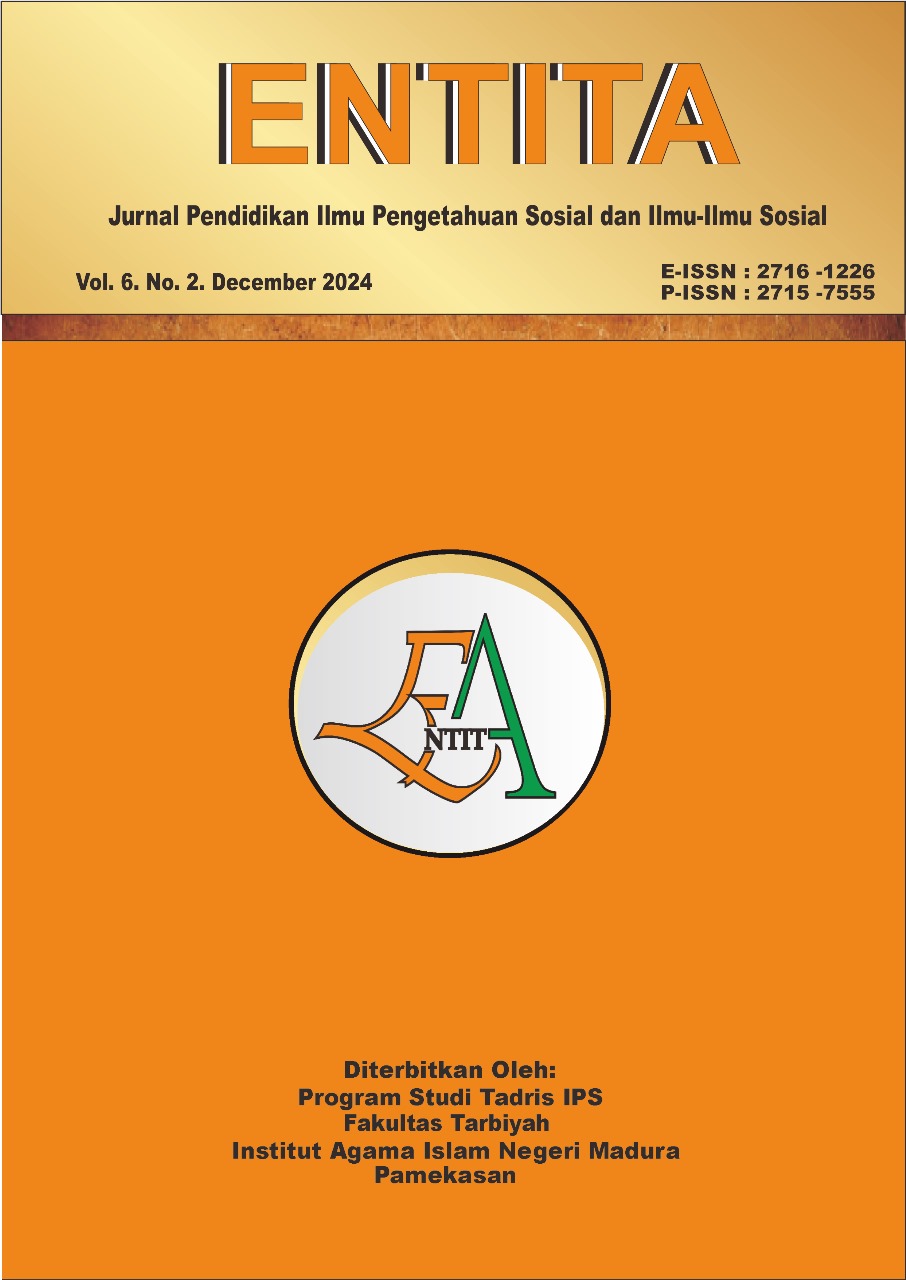Proses Tradisi Ngorek dalam Upacara Nyongkolan pada Masyarakat Sasak Desa Tanak Awu Kecamatan Pujut Kabupaten Lombok Tengah
 Abstract views: 136
,
Abstract views: 136
,
 PDF (Bahasa Indonesia) downloads: 128
PDF (Bahasa Indonesia) downloads: 128
Abstract
This study aims to: determine the process of the Ngorek tradition in the Nyongkolan ceremony in the Sasak community of Tanak Awu Village, Pujut District, Central Lombok. This study uses a qualitative approach with an ethnographic method. The data was used with primary data sources and secondary data with data sources of research subjects and informants. Data collection in this study used interview, observation and documentation techniques. Meanwhile, data analysis uses analysis techniques developed by Miles and Hubermen with the stages of data reduction, data presentation and drawing conclusions. The results of the study revealed that (1) the implementation of the ngorek tradition is carried out in three stages, namely the preparation stage, preparing the tools and materials for the ngorek tradition for the Nyongkolan Ceremony in the Sasak Community of Tanak Awu Village, such as traditional keris clothing and sengkebal oil. The ngorek tradition is carried out at the Nyongkolan event in the Sasak Community of Tanak Awu Village by stabbing oneself or other ngorek with sharp weapons on the body and other body parts. and (3) the closing of the nyongkolan tradition, the Nyongkolan Ceremony in the Sasak Community of Tanak Awu Village, which ends with the nyongkolan and pengorek participants disbanding.
Downloads
References
Arikunto, S. (2010). Prosedur Penelitian Suatu Pendekatan Praktik. Rineka Cipta. Jakarta.
Condra, J. (2013). The Greenwood Encyclopedia of Clothing Through World History. Greenwood.
Creswell, J. W. (2014). Research Design: Qualitative, Quantitative, and Mixed Methods Approaches (4th ed.). Sage Publications.
Frank, D. J. (2012). Culture as a Sense of the Past: Tradition and Historical Sensibility in Modern Societies. Sociological Theory, 30(3), 187-212.
Hasan, M. T. (2018). Psikologi Sosial. Rajawali Pers.
Koentjaraningrat. (2011). Pengantar Ilmu Antropologi. Jakarta: Rineka Cipta.
Koentjaraningrat. (2014). Pengantar Ilmu Antropologi. Rineka Cipta.
Krisna, P. W. (2020). Tradisi LSM Rek Lelaki Sasak: Studi Tentang Tradisi Membacok Diri di Desa Kateng, Kecamatan Praya Barat, Lombok Tengah. Universitas Mataram.
Magnis-Suseno, F. (2012). Etika Jawa: Sebuah Analisis Falsafi tentang Kebijaksanaan Hidup Jawa. Gramedia Pustaka Utama.
Mas'oed, M. (2011). Menggagas Kembali Nilai-Nilai Budaya Bangsa. PT Mizan Publika.
Moleong, L.J. (2014). Metodologi Penelitian Kualitatif. Bandung: PT Remaja Rosdakarya.
Moleong, L.J. (2016). Metodologi Penelitian Kualitatif. Bandung: PT Remaja Rosdakarya.
Munawir, M. C. J. (2019). Nilai Edukatif dalam Budaya Lombok Nyongkolan. Program Pascasarjana, Universitas Negeri Yogyakarta
Mulia, M. (2013). Gagasan Gender dan Agama dalam Perspektif Keislaman tentang Pernikahan. Jurnal Studi Pemikiran Islam, 12(1), 84-100.
Nasution, A. H. (2013). Perspektif Sosiologis Terhadap Perubahan Pola Pernikahan di Indonesia. Jurnal Penelitian dan Pengembangan Kesejahteraan Sosial, 6(2), 61-74.
Notonegoro, F. A. (2020). Hubungan Antara Attachment Dan Dukungan Sosial Keluarga dengan Penyesuaian Diri Remaja (Doctoral Dissertation, Universitas Islam Negeri Maulana Malik Ibrahim).
Novi Suryanti, NM, Sukran, MI, Nizar, S., & Hilman, H. (2022). Nilai, Hambatan, dan Dampak Sosial dalam perkawinan Artikel. Jurnal Seni dan Humaniora, Volume (26.4), 423-440
Nurochim, & Ngaisah, S. (2020). Ilmu Sosial dan Kemampuan Berpikir Kritis Matematis. ENTITA: Jurnal Pendidikan Ilmu Pengetahuan Sosial Dan Ilmu-Ilmu Sosial, 2(1), 51. https://doi.org/10.19105/ejpis.v1i2.3306
Nursaptini, N., Widodo, A., Novitasari, S., & Anar, A. P. (2020). Festival Bau Nyale sebagai pengenalan dan pelestarian budaya. Cakrawala, 9(1), 85–96
Pandya, S. (2014). Muslim Women and Islamic Resurgence: Religion, Education and Identity Politics in Bahrain. Routledge.
Syal Murgiyanto 2014 Tradisi Dan Inovasi Beberapa Masalah Tari Di Indonesia,Wedatama, Widya Sastra, Jakarta
Permata Sari, Y., & Azwar, W. (2017). Fenomena Bullying Siswa: Studi Tentang Motif Perilaku Bullying Siswa di SMP Negeri 01 Painan, Sumatera Barat. Universitas Islam Negeri Imam Bonjol Padang, Indonesia, Hal (338)
Rubin, H. J., & Rubin, I. S. (2012). Qualitative Interviewing: The Art of Hearing Data (3rded.). Sage Publications.
Sari. (2013). Strategi Blended Learning untuk Peningkatan Kemandirian Belajar dan Kemampuan Critical Thinking Mahasiswa di Era Digital. Jurnal Pendidikan Akuntansi Indonesia
Saldaña, J. (2016). The Coding Manual for Qualitative Researchers (3rd ed.). Sage Publications.
Soekanto, Soerjono, Sosiologi Suatu Pengantar, Jakarta: CV. Rajawali, 2011.
Jamaludin, J., & Sugitanata, A. (2020). Tradisi Ngorek Pada Upacara Nyongkolan Perkawinan Adat Sasak Tanak Awu. Al-Hukama', 10 (2), 319-348.
Sugiyono. (2014). Metode Penelitian Kuantitatif, Kualitatif, dan R&D. Bandung: Alfabeta.
Sugiyono. (2012). Memahami Penelitian Kualitatif. Alfabeta. Bandung.
Suryabrata, Sumadi. 2007. Psikologi Pendidikan. Jakarta: PT Raja Grafindo Persada. Jurnal Antropologi Budaya, (15), 15-16.
Syafruddin, N., & Suryanti, &. (2022). Penguatan pendidikan karakter berbasis kearifan lokal pada anak di kawasan ekonomi khusus mandalika. 6, 1909–1913.
Thufail, F. I. (2015). Tradisi dan Inovasi dalam Masyarakat. Balai Pustaka.
Wiyono, B.B. (2017). Metode Penelitian Sosial: Berbagai Pendekatan Populer. Jakarta: Kencana.
Copyright (c) 2024 Entita: Jurnal Pendidikan Ilmu Pengetahuan Sosial dan Ilmu-Ilmu Sosial

This work is licensed under a Creative Commons Attribution-NonCommercial 4.0 International License.
ENTITA: Jurnal Pendidikan Ilmu Pengetahuan Sosial dan Ilmu-Ilmu Sosial operates an Open Access policy under a Creative Commons Non-Commercial 4.0 International license. Authors who publish with this journal agree to the following terms:
- The copyright of the received article once accepted for publication shall be assigned to the journal as the publisher with licensed under a

- Journal is able to enter into separate, additional contractual arrangements for the non-exclusive distribution of the journal's published version of the work (e.g., post it to an institutional repository or publish it in a book), with an acknowledgement of its initial publication in this journal.
- Journal is permitted and encouraged to post their work online (e.g., in institutional repositories or on their website) prior to and during the submission process, as it can lead to productive exchanges, as well as earlier and greater citation of published work (see The Effect of Open Access).
- Here is Copyright Transfer Form that author can download and send to OJS during submission.

















